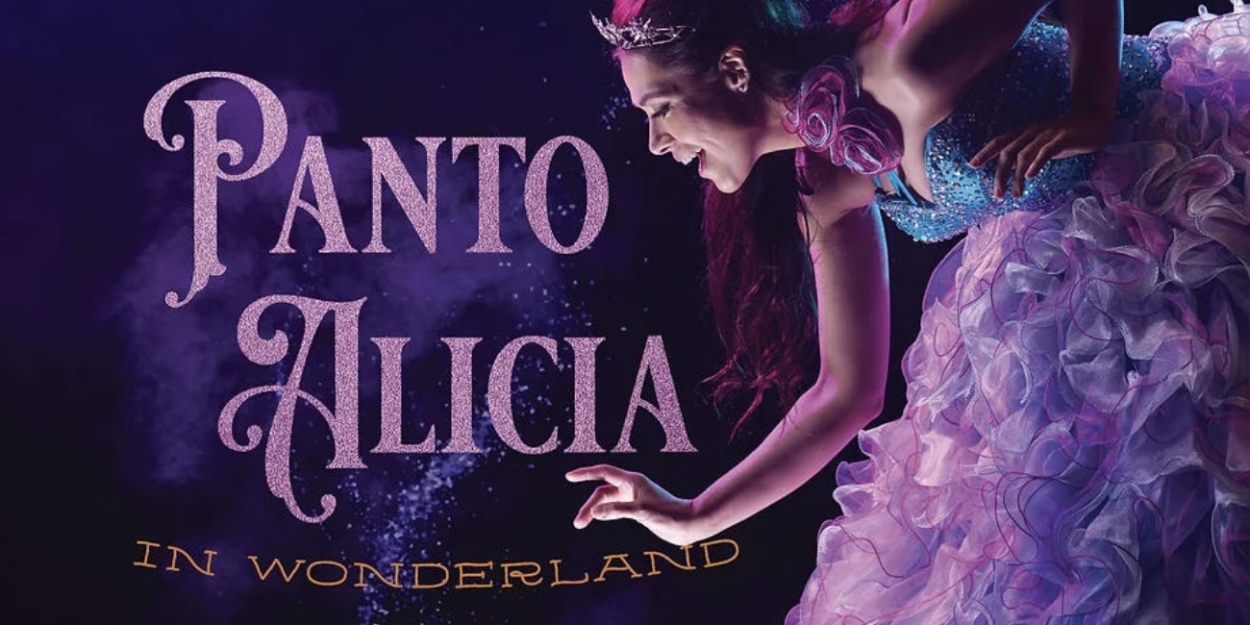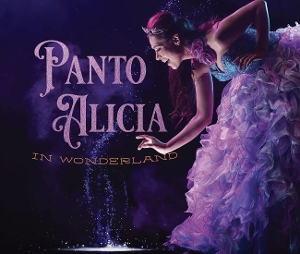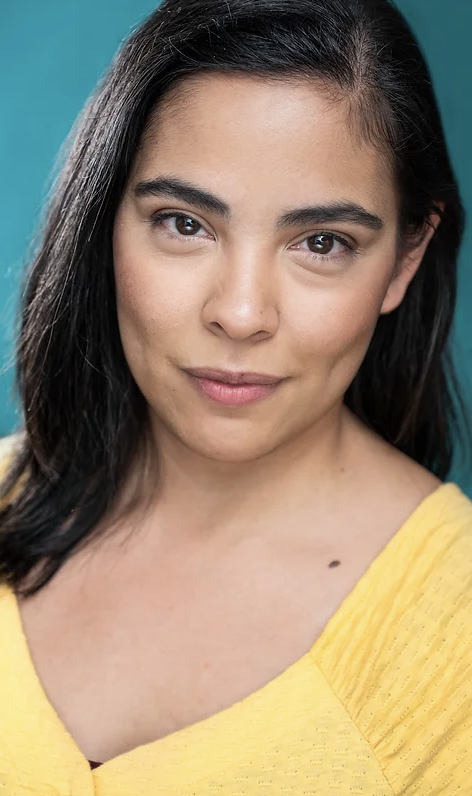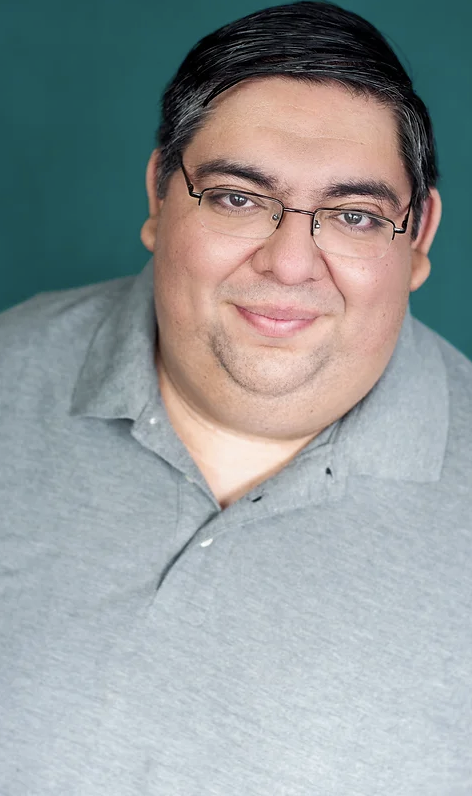Co-Directors Benito Vasquez and Marissa Castillo Give Us A Sneak Peek of PANTO ALICIA IN WONDERLAND, a Latinx and Houston Twist on the Classic Tale!
Created by Houston’s own TEATRX—and studded with parodies of Shakira, Jennifer Lopez, Bad Bunny, and more—this show sounds like one you do not want to miss!


"Panto Alicia in Wonderland"
Starting next week, Stages is beginning the run of its yearly panto tradition. This year, Houston's own TEATRX has written the production, giving the classic fairy tale of "Alice in Wonderland" a fresh new Latinx and Houston spin! I had the delight of being able to speak with two of the creators as well as the co-directors of the show: Marissa Castillo and Benito Vasquez. The directing team gives BroadwayWorld a sneak peek into the show, informs us of what panto is and how TEATRX added to the tradition, tells us about how this piece came to be, and shares with us what makes this show unique and special.
To start us off, can one of you or both of you tell me the story of “Panto Alice in Wonderland” in your own words?

Marissa Castillo: “Panto Alicia in Wonderland” is our twist on the classic fairy tale of “Alice in Wonderland”. In our panto, we find Alicia just before her big quinceañera that's going to be the next day, and she's pushing back against the traditions of what things are and what they're supposed to be…pushing back against her family on what she wants and how she wants her name to be said (because all her friends at school call her “Alice” and not Alicia)... So, she goes down the rabbit hole and starts her journey through Wonderland.
Benito Vasquez: As Marissa said, the show is about questioning these traditions and ceremonies of going from girlhood to womanhood. Alicia is wondering, why am I being forced to do these things? I don’t really connect with this tradition. Once in Wonderland, she explores (in a very weird, nonsensical, fun way) these traditions and her self-identity going from a young girl to adolescence. Wonderland is not guiding her in one way or another; it's really just asking those questions, and it allows her to reflect on that. Through her journey, she figures out what is still important to her as far as the traditions and the roots that guide her and what it is that she wants to keep. In other words, she figures out what she identifies with and what she wants to move past.
I understand that this is TEATRX’s first time writing a full-length play and that you are partnering with Stages to make this story come to life. What has the process and collaboration been like building this production?
Marissa Castillo: It has been a very collaborative process! I think on all of the media, it says by TEATRX because it truly is by five members of our team, including Benny and I. When Kenn (from Stages) approached us about writing the panto, we wanted to come at it as a team because—even within our group—we are a diverse group of Latinos, and we each have our own perspective. So, adding and layering all of that into Wonderland was a big part of how our Wonderland will appear to audiences

Benito Vasquez: Not only that, but it’s a big way of how TEATRX works; we want to showcase the diversity in Latinidad. So, you know in certain parts of the US, being Latino means a certain thing. In Houston, it tends to be Mexican. On the East Coast, it's more Puerto Rican and Dominican. In Florida, it is more Cuban. So, we really tried to celebrate all the diversity, specifically because panto is about taking a fairy tale and localizing it. So, what does Houston look like? Having all those different voices in the room, we really got to play with what different things are like. For example, Mexico (and Texas) does not have the same quesadilla as El Salvador; in El Salvador, it is a dessert.
Also, one more layer: when we say this was a very collaborative process, we wrote the first draft and then invited actors that we trusted to start working with us. We brought them in for readings when we got to a point where we weren't moving forward, and then once we heard their voices and their feedback, the script continued to grow a lot. Then—of course—in the rehearsal room, it continues to grow. It’s not like there are any big overhauls in the rehearsal room, but every actor in the room really adds something to the characters and to the story. With every step we take, the story gets fuller and fuller and more clear.
Then, finally, I want to say that the panto aspect….that's not a theatric tradition; that's Stages' tradition. So, we are fairly new to the panto tradition. Kenn (Stages’ artistic director) has been very helpful and informative; he is really guiding us in what the panto traditions are and where we can add those moments to our script. So, we are staying true to the Stages’ tradition, but it has that TEATRX twist, which is exciting.
Wow! I have a couple of follow-up questions based on your response. First off, can you talk to me about the panto tradition? I myself am not informed on what that is!
Marissa Castillo: It primarily is a British tradition; it happens all over in the UK during Christmas/holiday time. Stages’ tradition is similar, but Stages takes other fairy tales. At last year's Stages’ panto, they did "Snow White and the Seven Dwarfs", and they did it as “Snow White and the Seven Dorks”. So, we take a fairy tale and then bring it to now. Also, a panto is made to be hyper-localized to wherever it is performed. So, we are localizing it to what Houston is. We have a mural that will be showcased on our stage by Gonzo, the muralist. We have characters like The Cheshire Cat, who is a play on Joel Osteen. We've got a whole game show where the spokes on the game show wheel are candy apple cars driving through Houston. So, a panto is taking a fairy tale, twisting it up, making it more modern, and making it more relatable so audiences can respond to it in a new and fun way.
Benito Vasquez: Another aspect that comes with panto is parodies of pop music, so we are using Latino pop music such as Shakira, JLo, Bad Bunny, and Cardi B. We’re using those songs and making parodies off that pop music, so that's where the singing and the musical part of the play happens.
Wonderful! So, how did it come to be that you got to collaborate with Stages?
Benito Vasquez: That’s actually a great story!
Marissa Castillo: So, this is actually our second attempt at writing a musical. Our first attempt was from our annual short play festival: "La Vida Es Cortos". In our second year, we saw a short film called Sexo y Tortillas, and it was an audience favorite. It is about this woman bringing sex toys to Mexico and selling them door-to-door. The purpose of the film was to demystify the idea that sex toys have to be taboo. We weren’t sure how audiences were going to take it, but they surprised us. They just loved it, and it was voted the favorite film of the festival. The laughter and conversation that came out of it was really exciting. We loved the story so much that we were not quite done with it, so 2020 happened, and we were wondering what we wanted to do. Then, we thought, we have talked about making this film into a musical, so let’s just do that! We worked remotely on the show, and we got it to the point where we were ready for an audience. When we wanted to put it all the way up on its feet in 2022, Stages graciously let us use their space to hold a workshop of the musical. Kenn came by since he happened to be in the building, and we were looking for feedback. He loved it, and he (and everyone else who saw it) really responded to it. So, he called us and said, “Hey, let's have lunch!”
Benito Vasquez: That’s when he brought us the idea that they were looking for someone to write their panto for next year, which was going to be based on “Alice in Wonderland”, and he was wondering if TEATRX would be interested in doing it. He felt that we were right for the job since he was really touched, impressed, and inspired by our work, and he really liked our cumbia-style music. He asked if we would do the panto, and we said, “Yeah!”
I'm so intrigued by your theatre company! Have you both been with TEATRX since its beginnings? How long has TEATRX been around?
Marissa Castillo: We started TEATRX; we're the cofounders of TEATRX, which started in 2018. We started it to just fill in the need that Houston had for Latinx theatre. There is some Spanish-speaking theatre here, but we do not really like to put ourselves in a box of having to speak one language or the other language because—here in the United States—there is so much cultural fusion happening as well as diversity.
Benito Vasquez: We keep talking about the diversity within the Latinx community and within ourselves. For example, I speak Spanish, but Marissa only understands it. Everyone on our team is different, so we are really representing Houston and all aspects of Latino culture. We cannot fit in a box! For example, we did Sonia Flew, where we got to reach out and talk a little bit about the Jewish Latinx community; in Houston, there is a pocket of Jewish Latinos.
Very cool. I am wondering, what unique opportunities and/or challenges did this play/production present?
Benito Vasquez: When we were approached about doing the panto based on “Alice in Wonderland”, we took that idea, gathered, and watched the Disney original just to see if we were going to be inspired. We thought, wow; this is more nonsensical than I remember. It’s funny, it’s crazy, it’s out there, and it doesn’t really necessarily connect. There is no through line. There is no clear villain until the very end when the Queen of Hearts shows up. That was the challenge of trying to figure out how to tell this story and who our Alice is.
Marissa Castillo: When we were asking who our Alice is, we really looked at the Disney Alice and the original Lewis Carroll version, and it seemed like the consensus was that it was a metaphor for how confusing the world is for a child as they transition into adolescence or adulthood. Wonderland represents the chaos and that nonsense; the world does not quite make sense. Then, we began to think about how adolescence is one of the most confusing times for young people, and we realized that there are a lot of different ceremonies in different cultures that celebrate the transition from adolescence to adulthood, specifically with women (such as debutante balls, bat mitzvahs, or the Sunrise Ceremony for the Apache tribe). After they hit puberty, they celebrate their transition into womanhood, and the quinceañera is such a popular tradition. Nowadays, it has moved from a traditional party into a big fancy party. Traditions are changing, such as going from the last doll to a teddy bear, or traditional dances being done with pop music instead of the traditional waltzes. We thought, wow; this really makes sense. This is a confusing time, but it is also a time to celebrate these traditions and roots that are so important to family. It’s her growing up, and there are all these rules that come with when you're grown or when you're older. You have to act a certain way and be a certain way, especially for women. You have to be more mature (whatever that means, right)? These rules get put on Alicia, and some of Wonderland is being able to explore the idea that you can still be playful. In our current world, a 15-year-old is still a child, so the idea of a coming-of-age ceremony when you’re essentially still a child does not make sense. It is different now since women used to get married, have children, and take care of a home after these ceremonies.
Benito Vasquez: I think some of the challenges we are playing with is that we don't necessarily think that all of these traditions are right or that they should happen. So, there is the idea that Alice should be able to make her own choices. She should have agency, and she should find herself. At the same time, she needs to know how she got to where she is today, so there is a delicate balance in the story and in life. You don't want to completely abandon everything that came before you, but that doesn't mean you necessarily have to take it all with you. You can leave what you want behind and take what you want with you.
Marissa Castillo: Yeah, you can choose the traditions that you connect with and then create your own traditions to move forward with.
I believe anyone from any culture can relate to that conflict with traditions! What was your process of building your show’s team?
Benito Vasquez: I think that this process has been so great because TEATRX is relatively new, and we don't have the resources that Stages has. So, being able to not only write the story that is uniquely ours and then put it here with Stages’ resources and connections has been a gift. We also have been sharing resources with Stages, as well. As far as when it comes to people from our team, we have our lighting designer Ash Parra and our amazing scene designer Tania Barrenechea, who we brought on board after meeting her at the Lantinx Theatre Commons Colaboratorio. That event was an exploration of how directors and designers can collaborate that's not that Eurocentric/pyramid model where it's director and then designers; we were wondering how we can collaborate and communicate where everyone has equal weight when it comes to inputting ideas. We were exploring those things in Oregon where the Colaboratorio was formed, and I got to meet a lot of wonderful designers. At that point, we still didn't have a scenic designer, and Tania right away really popped out there, and I got to introduce myself and meet her. Then, we looked at her portfolio and thought, this is the right person, especially considering the specific culture of our work. She checked all our boxes! Then, Stages brought on Kristina Miller, the fabulous costume designer who also identifies as Latina, and she has an incredible portfolio. Her designs are just so thoughtful, unique, and really established within the community. She also knows what panto is, so she provided the institutional knowledge of what a panto is into the design process, as well. There has been a lot of collaboration!
That’s incredible; what a great project! It is very exciting when multiple theatre collectives work together to make a new piece. So, what has been your most memorable experience so far in the rehearsal process?
Marissa Castillo: Oh my gosh… I think we have a song towards the end that is our version of Camila Cabello’s “Bam Bam”. It is a super fun song, and listening to our version of it for the first time was probably my favorite moment. I think something that's exciting about our panto “Alicia in Wonderland” is that there is so much heart in it. We've got our Anthony Almendárez (who is part of TEATRX), and he put the music together for this. He layered in harmonies for that song, and when we all sing it together, it is just a beautiful, touching, and funny piece. The harmonies are just right, and I believe it is going to touch everyone in our audience. Everyone knows what it's like to be growing up and hit whatever that marker is (whether it is 15, 18, 30, or 50 years old). In those moments when you have people around you (such as family or other people who love you), you are all experiencing that moment together. I think that it is very beautiful. I think everyone is going to feel that when they hear this particular number.
Benito Vasquez: Mine is going to be a little bit of a typical boy answer, and I am also biased because I was one of the main writers for this scene, but I love the scene with the lucha libre wrestling match. When I first got to see the choreography that Luke Fedell brought to the table as the fight choreographer, I thought, this is just so fun and funny! Just watching it come together has been great.
So fun! Overall, what do you want the audience to take away from seeing this show?
Marissa Castillo: Oh… so much! I think we as a theater company want to define ourselves. We want to show who we are and what we're about, just like how Alicia wants to define herself and be who she is, no matter how long the journey takes. I hope that when people leave, they are satisfied with where they are, no matter where they are in their own journey. We are always looking for more and looking at what is next, but we should have fun with the journey, appreciate where we are now, and know that we are not done.
Benito Vasquez: I have two things that I hope happen. One: I hope that the audiences that are used to their panto enjoy this new bilingual version. We're taking a tradition that they're used to doing every year; they know their buttons and their responses, and because we went to last year's panto for our research, we saw how educated this audience is about their panto. That is very special, and I hope that our audiences find our panto just as fun. Everything they know and love is still there; it's just a little bit different in the sense that everything of the Latino culture comes into play with this tradition. Two: I hope that our show then brings in a new audience to explore the panto tradition that they are not aware of. I want these two worlds to come together so we can all have a great, fun time during the holiday season. We want everyone to leave singing some of the songs or just talking about the wrestling match!
To finish us off, can you remind BroadwayWorld readers when and where we can see this production?
Marissa Castillo: So, it's going to be at Stages in Houston at 800 Rosine St., Houston, TX 77019, and we'll start previews on December 1st. Then, our opening night is on December 7th, and it goes all the way through December 31st. So for the entire month of December—if you're here between Wednesday and Sunday—you can catch a show. While we are doing this interview, the team is working hard in there right now, and they'll be working hard for the rest of the month. It has been so fun!
For only $25, you can now buy tickets for this magical show here!
Comments

Videos

